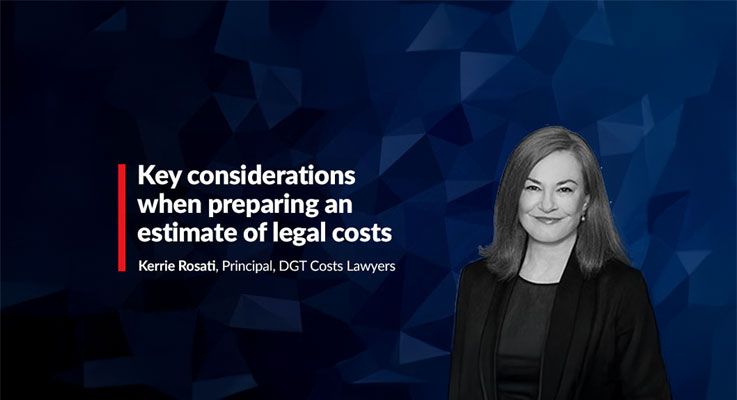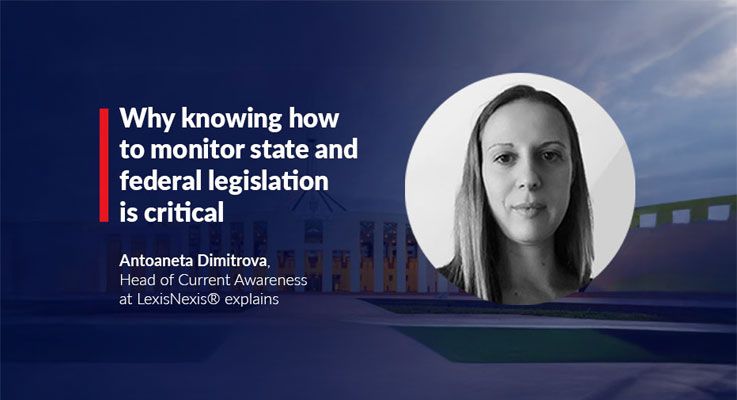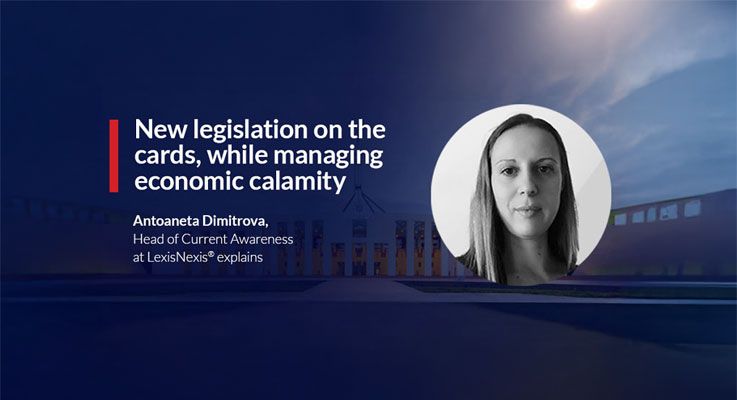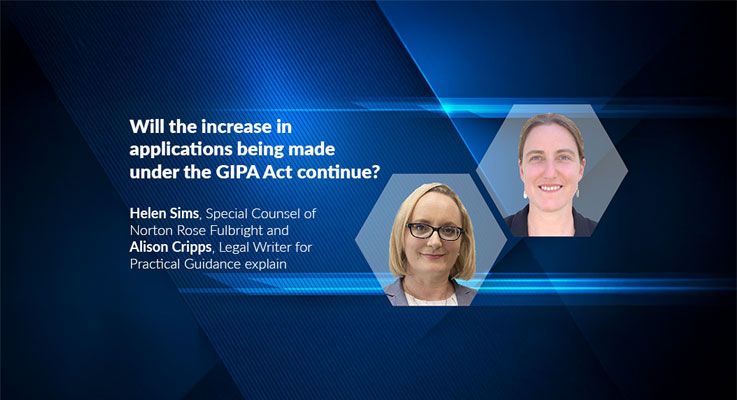Insights

Key considerations when preparing an estimate of legal costs
This article sets out several key considerations for legal practitioners, barristers, and litigators when preparing a cost estimate, and addresses the following questions. Why is providing an estimate of legal costs important? How should you draft the costs estimate, and should you provide single-figure estimates or estimates in within a range? In litigious matters, how do you estimate the recovery from other...

The 5 characteristics of a Tech-Enabled In-house Lawyer
In-house lawyers used to operate like independent advisors – there to answer any pressing legal questions you might have or to run a document past before signing the dotted line. But a few years back we saw this change. In-house legal teams transitioned into high-functioning, commercial-savvy legal assets, there to help propel the business forward. Now we’re seeing a similar transition – but this time it’s being driven...

Blog 3: Wallet creation
If we were to journey back in time to the birth of the crypto wallet, perhaps we would discover someone employing ‘poetic license’ behind their creation because, despite the name, crypto wallets do not contain crypto (which is kept on the blockchain) and nor are they ‘wallets’ in the traditional sense of the word. Crypto wallets in fact contain private keys (secret and randomly generated numbers and letters with hundreds...

Why knowing how to monitor state and federal legislation is critical
Thousands of measures are proposed across Australia annually, and hundreds end up being legislated, ranging from relatively minor, to wide-ranging policy that can have major social, economic, or industrial significance. This was the case even during the Covid-19 pandemic lockdowns when Parliaments across the country had risen indefinitely. Proposed legislation seldom gets front-page treatment, but it can have a significant...

New legislation on the cards, while managing economic calamity
As global and local economic conditions continue to tighten, the challenge facing newly elected Anthony Albanese who has kicked off his legislative agenda already is growing by the minute. The PM has said he wanted to prioritise climate change targets, the establishment of a federal anti-corruption body, as well as plans to mandate domestic violence leave, and tackle worsening skills shortages during his first 100 days...

Alex Mitchell’s Top 5 Tips for Delivering Value as a General Counsel
Alex Mitchell, the Asia Pacific General Counsel at Unisys is an expert writer and contributor for LexisNexis® Practical Guidance. In a recent video interview, Alex detailed his top 5 tips for delivering value as a General Counsel and outlines several great ways to drive collaboration between your legal team and business. What are your top 5 tips for delivering value as a General Counsel? I would aim to have a...

A crisis management guide for in-house counsel
Preparing for a crisis? Natural disasters, power cuts, industrial accidents, stakeholder activism or cybercrime, or simply the loss of a partnership contract are only some of the events that could precipitate a crisis, resulting in damage to your organisation’s operations, its brand and reputation. How your business responds to a crisis could potentially cause irreparable damage to its operations, brand and reputation...

The push to net zero intensifies, but can we keep the pace?
If the wind of change a new Government typically carries fails to create a buzz in Australia’s new Parliament, a diverse crossbench, in both the Lower and Upper Houses, and invigorated public discourse, certainly will. Coming in with a hefty agenda, and a commitment to do things better, the Albanese Administration will not have an easy ride despite a crossbench peppered with in-principal support. Take climate change...

Climate change laws set to test new Parliament’s resolve from day one
Election promises aside, Australia’s newly minted Government plans to introduce climate change legislation as soon as the 47 th Parliament convenes this month for the first time. Prime Minister Anthony Albanese, flanked by Climate Change and Energy Minister Chris Bowen, and Assistant Minister, Senator Jenny McAllister, confirmed lodging an updated Nationally Determined Contribution (NDC) with the United Nations Framework...

NFT Part 2: It’s all about what to create!
You may recall that a couple of weeks ago LexisNexis ® announced a creative and we think ambitious project – we are going to launch the first ever NFT of one of our Guidance Notes. Today I wanted to share with you some of the initial questions that we, as a large multinational corporation, were required to ask and answer as we embarked on our journey to creating (and ultimately minting) our very first NFT. We have...

Legal drafting and the promise of technology
Drafting is essential but can be tedious, time-consuming and error-prone. How can technology help? Good legal drafting is a key skill for many legal professionals, and one that is ordinarily learned in the workplace from matter to matter rather than in formal education. For transactional or front-end lawyers in particular, negotiating, drafting, reviewing and executing contracts are the work of an average day in the...

Help! I need to create an NFT. Where do I start? A Step-by-step guide.
LexisNexis® is giving you a chance to be the very first owner of the first ever non-fungible token (NFT) (that we know of) of “Practical Guidance on NFTs”. Yes, we are going to NFT the guidance note on NFTs! So, how much would you pay for an NFT of practical advice on NFTs? You might be wondering why LexisNexis would embark on such an unusual project? After all – we are known for our extended range of quality, market...
ASIC Releases guidance on focus areas for financial reporting FYE 2022
On 6 June 2022 the Australian Securities and Investments Commission announced new guidance on focus areas for financial reporting for FYE 2022. As in previous years, ASIC reminds directors, auditors and preparers of financial reports for entities to focus on reporting of: factors affecting asset values — including impairment of non-financial assets, the value of property assets, expected credit losses on loans and...
Dyco Hotels Pty Ltd v Laundy Hotels (Quarry) Pty Ltd: Buyer of hotel affected by COVID-19 health orders wins return of deposit on appeal
The NSW Court of Appeal has allowed an appeal from the purchaser of a hotel business affected by COVID-19 public health orders, finding that although the contract was not frustrated, the vendor could not insist on completion and had repudiated the contract by purporting to terminate. Background In January 2020, Dyco Hotels Pty Ltd and Quarryman Hotel Operations Pty Ltd (together, Dyco ) contracted to buy the Quarryman...

In 2022, artificial intelligence and machine learning permeate our work and home lives. But what are they?
Lawyers and other professionals must apply their expertise to the hard problems of law, business, and society in a saturated information environment on a daily basis. What’s more, the legal, financial, and geopolitical landscape in which we work is constantly evolving and becoming increasingly complex. In this context, new technology solutions are indispensable tools for achieving our goals, staying agile, and maintaining...
APRA releases guidance on managing crypto asset risks
On 21 April 2022, the Australian Prudential Regulation Authority (APRA) issued risk management guidelines (in the form of a letter) for APRA-regulated entities that engage in crypto asset related activity. The guidelines outline APRA’s risk management expectations and a policy roadmap for regulated entities that engage in crypto activity. Who needs to know? Organisations under the regulation of APRA should review...

Challenges for council landlords in and out of the COVID-19 pandemic and managing their leasing portfolios
Managing a large and varied leasing portfolio can be challenging for any landlord, and most landlords are constantly looking for tools to assist them to efficiently manage their leasing portfolios, particularly during a quickly changing regulatory landscape, like we have during and following the COVID-19 pandemic. Due to various factors, councils arguably have a greater need for such tools. As owners of land (or managers...

Indigenous Cultural IP – new topic on Practical Guidance Intellectual Property
Australia’s Aboriginal and Torres Strait Islander people have been calling for stronger measures to recognise, protect, and maintain all aspects of their culture and heritage. Globally, there is growing recognition of ‘Indigenous Cultural Intellectual Property’ or ‘ICIP’ which is the term used to describe the fundamental human rights of the world’s Indigenous Peoples to manage and control their tangible and intangible...

It’s election time! Will the increase in applications being made under the Government Information (Public Access) Act continue? GIPA and the objective of balance
There will usually be an increase in applications for access to information under the Government Information (Public Access) Act 2009 (GIPA) in the lead up to any election or after a significant change in government policy. For example, the announcement of the NSW council amalgamation plans and their reversal led to a significant number of access applications, as did the light rail project and WesConnex. No doubt you...

A question of notice: employment contract’s implied term of reasonable notice versus the Fair Work Act’s notice provisions.
Courts have had to decide many cases in which a dismissed employee claims damages for breach of contract, the alleged breach being the failure to give the amount of notice that was implied into the contract (because there was no express term specifying the period of notice to be given). For a long time, the implication of such a term was widely accepted. However, there is a growing body of cases that questions whether...

Understanding your contracts with workers
The contract is in the driving seat, but who is in control? Where are we going, and most importantly, how do we get there safely? Two recent High Court decisions, Construction, Forestry, Maritime, Mining and Energy Union v Personnel Contracting Pty Ltd [2022] HCA 1 ; BC202200585 and, ZG Operations v Jamsek [2022] HCA 2 ; BC202200580 , said it is the contract which decides if a worker is an employee or a contractor....

Be careful what you wish four: Australian considerations of a 4-day work week
Aurora borealis (the Northern Lights). Stunning landscapes. Outdoor hot-tubs, year-round. All of these, you will find in Iceland. And yet, recently this country has been in the headlines not for these things, but for its work practices? The 4-day work week. It is the talk of the town. From Reykjavík to Randwick, there has been an unmistakable uptick in talk of workers working 4 days but being paid for 5. Although, as...

Making the most of your firm's data with Lexis®︎ Web Service APIs
Interview with Lindsay O ‘Connor , Head of Core Product Pacific Formerly a lawyer, Lindsay now manages a team of talented Product Managers with responsibility for driving new product developments as well as the roadmaps for existing products. Having once been a customer of LexisNexis, Lindsay is passionate about driving efficiency improvements for lawyers enabling them to spend more time building their practice and...

Lessons from technology: how to compete, co-operate and reinvent your firm for success
No doubt, too many times you’ve been told that your business is about to be disrupted. That innovation, or a particular technology, will change the way the law works and how legal firms make money. That the sky is falling and your days are numbered – the Amazon of legal is just around the corner! Or even worse, they are already here! But despite all that, when you look around you’ll see that the business of law, and...

Powering Law with Data APIs
Law firms across the world are increasingly becoming conscious of the pivotal role Data plays in determining the future of their business and practice. At the centre of every matter, every case and every argument is Data. Data about historical judgments, legislation, analytical content, expert opinions and firmographic information about clients, industry news, the opposition or your own teams. Legal research is and...